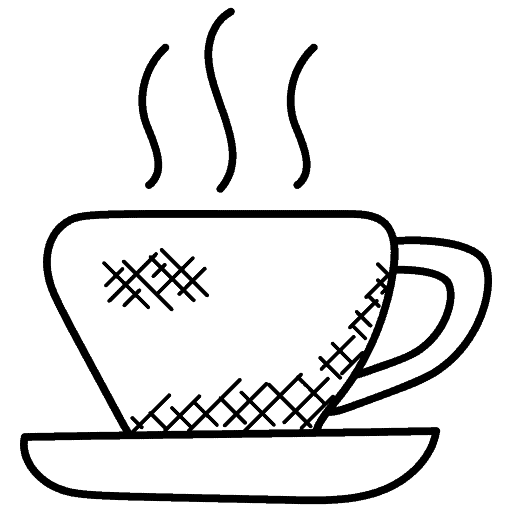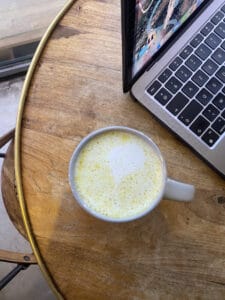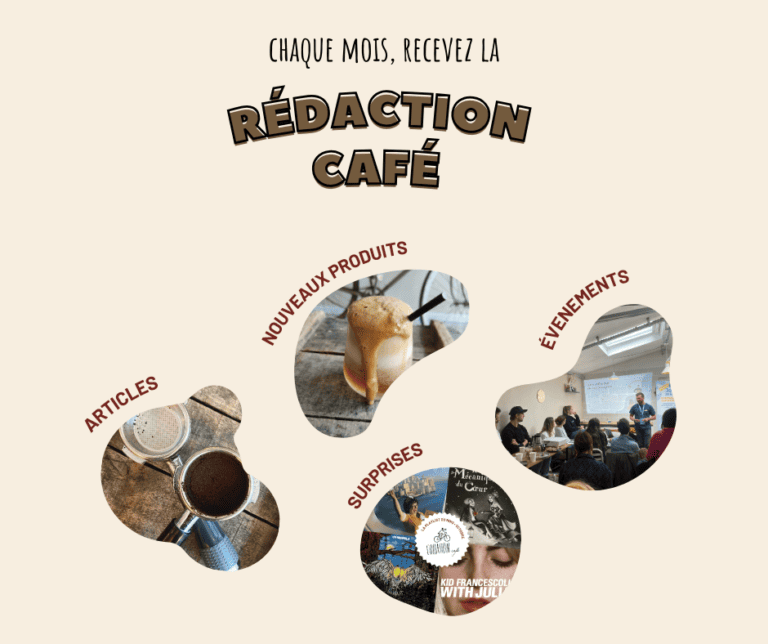Specialty coffee professions
When it comes to the specialty coffee business, there are many people working to make a great cup of coffee! ☕️
As you may know, the production and harvesting of specialty coffee is a meticulous process. If you’d like to find out more, we’ll tell you all about it in this article…
But it doesn’t stop there. Every player in the coffee chain is committed to respecting the product right up to the moment it is extracted in a cup. So if roasting sounds familiar, it’s not the only step involved… Coffee is subject to a long chain of interventions and transformations. 😌
However, one of the particularities of specialty coffee is that it has to be very transparent about its production. This is to offer you a good and ethical product! So in this article, we explain the path of the coffee bean. From harvest to the moment it lands in your latte at your favorite coffee shop. 🧐
Stage 1: The producer
The first step is, of course, growing the coffee. For those who don’t know, coffee cherries are harvested from small bushes. Growing coffee is a meticulous process, which requires a number of conditions to be met! Coffee farms are often located in hot, humid countries. What’s more, each country has its own way of doing things. 🌎🌍🌏
In fact, once the seeds have been harvested (the seeds that are initially green), the grower will have to proceed with drying the seeds. There are several types of drying. Drying will play a major role in the aromatic profile of the cup of coffee… Depending on whether it’s washed, honey, plain… the coffee won’t have the same flavor once it’s in the cup.
Once the harvesting and drying process is complete, the producer has bags of green beans at his disposal. He’ll then have to sell them on the market! 👀
Green coffee buyer
Here, we enter a more business-like side of the coffee market. The green coffee buyer finds, evaluates and negotiates the best beans from producers, then offers them to the roaster. His role is that of matchmaker. He must unearth the latest nuggets and novelties from the farms by traveling to coffee-producing countries. 😄
The green coffee buyer sets prices and evaluates coffee according to its quality, to ensure a fair market between the producer and the roaster. Indeed, thanks to him, the producer is remunerated at the right price according to the quality of his product. 😌
He then recovers the green beans. He then handles the logistics and the sale of the bags to the consuming countries, where coffee is in high demand. ☕️
The roaster
You’ve probably already heard of the roaster (and read our article on the subject.) Roasting is the process of cooking the coffee beans. Without it, the coffee cannot be consumed. ☕️
Like every other player in the specialty coffee world, the roaster must have in-depth knowledge of the subject. Each green coffee has its own particular characteristics. As a result, it will need to be roasted differently. The roaster must adapt the right roasting profiles to the different beans.
Roasting is a meticulous process. The roasting time, temperature and rate of gas entering and leaving the machine must be carefully managed.
Roasting will have a major impact on the aromatic profile of the coffee in the cup. For example, the more the coffee is roasted, the darker it is, and therefore the more burnt and overcooked it is. Dark coffee contains very few aromas and develops a lot of bitterness (which you don’t want in a good coffee.) Conversely, the less it’s roasted, the more it will contain all its aromas and the richer and more complex its profile will be. ✨
As a result, lovers of specialty coffee will advocate a coffee without bitterness. Unfortunately, this is the opposite of what we’re used to seeing with so-called “common”, cheap coffees… 🫢
In fact, a good specialty coffee ranges from a light (or even extra-light) to a medium (or even light-medium) roast.
However, a light coffee will be harder to work with. Depending on the coffee’s profile, recipes will be more elaborate and personalized. This is where the role of the barista comes into play. He or she will guarantee a cup of coffee that exploits the full aromatic potential of the bean. 😌
The barista
The last step on this long road is the barista. Every day, he prepares coffees purchased from his roaster. Of course, he must know the coffees he serves by heart. He’s aware of the producer’s initial intentions, and the profiles of each coffee. 😋
The barista must be an expert in the field in order to be able to sell and advise. He will also work on his slow coffee recipes, for example. A bit like a roaster who chooses a particular roast for each coffee. As we’ve seen, every coffee needs its own particular treatment, and therefore a different recipe to exploit its aromas.
The barista is also the only direct contact between coffee producers and consumers (although many coffee shops also roast their own coffee.) As such, he also advises his customers on the different types of coffee, the different profiles and the different ways of preparing coffee. Because, in addition to the drinks he serves, he also sells sachets for coffee lovers 😉
The barista advises you, listens to you and introduces you to the latest innovations. The last link in this chain plays an important role in consumer satisfaction. But he works in harmony with the producer, the green coffee buyer and the roaster, all of whom have the same objective: to offer a specialty product that’s high quality, ethical and responsible.

We hope we’ve shed some light on the specialty coffee market. Few people realize just how much work goes into making a good coffee.
There are different trades, often living in different parts of the world, but all working towards the same goal ❤️
Enjoy the dedication that goes into every cup of specialty coffee, and see you soon at Occasion Café. ✅
Our articles

3 ways to give your coffee a twist
If you put a lump of sugar in your coffee, stop! There are other ways to sweeten and twist the

Golden Latte : a 5,000-year-old drink…
Golden latte has many virtues, not least its anti-inflammatory properties. We tell you more about it here, and what makes

Chai tea: its origins, its benefits…
Many of you are fans of chai tea. Spicy and comforting, this tea has a unique history and many benefits

